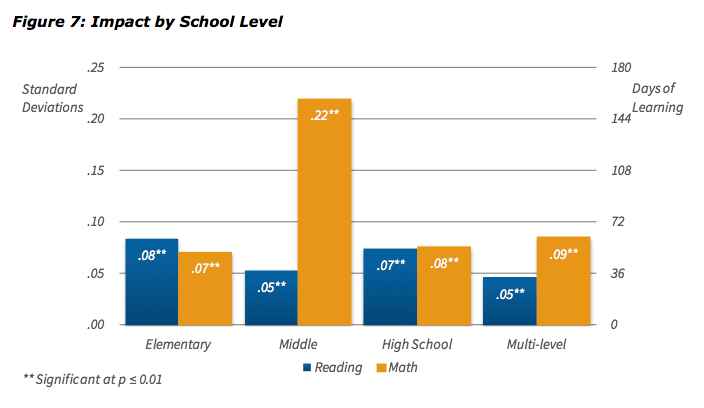Students in independent charter schools in the Los Angeles Unified School District significantly outperform similar students in traditional schools in the district, according to a report released last week by the Center for Research on Education Outcomes (CREDO) at Stanford University. The gains were particularly large for schools serving low-income Hispanic students.

CREDO translated the statistical results of academic achievement between similar students in Los Angeles Unified district and charter schools, as measured by standard deviations, into additional learning days. Charter school students showed significant gains in reading and math in all grades, but middle school math showed the biggest gain, the equivalent of 158 extra days of learning, nearly a full year. Source: CREDO’s “Charter School Performance in Los Angeles Unified.”
Los Angeles charter schools also far outpace charter schools nationally, according to CREDO, which published an extensive national comparison last year. In Los Angeles, 48 percent of charter schools had significantly larger gains in reading and 44 percent did much better in math than traditional school counterparts, while 13 percent did significantly worse in reading and 22 percent did worse in math. Nationwide, 25 percent of charters did significantly better and 19 percent did significantly worse than similar traditional public schools in reading; in math 29 percent did better but 31 percent of charters did worse.
“The results in Los Angeles are among the strongest observed in any of the previous CREDO studies,” the report said.
Los Angeles Unified had 195 independent charter schools serving 82,000 of the district’s 670,000 students in 2010-11, making it the largest charter authorizer in California and one of the largest in the nation. Charters served slightly fewer low-income students (70 percent vs 75 percent in the district), English learners (21 percent vs 29 percent) and special education students (7 percent versus 11 percent) but more African-American students (15 percent vs 9 percent) and white students (14 percent vs 8 percent).
CREDO said it factored these differences into its calculations in matching records of charter and traditional school students. It then roughly translated the growth in standardized test scores into what it called equivalent “days of learning gain,” which it defined as how much more learning, based on a 180-day year, those scores reflected. Its conclusion: “On average, charter students in Los Angeles gain an additional 50 days of learning in reading and an additional 79 days of learning in math over their traditional public school counterparts.”
Among Los Angeles’ charters, those run by charter management organizations such as Aspire and Alliance of College Ready Public Schools did the best: 65 additional learning days in reading and 122 days in math, about double and triple the gains of non-affiliated charters in reading and math, respectively.
Low-income charter school students in Los Angeles gained 14 more days of learning in reading and 43 more days of learning in math compared with their peers in traditional public schools. Gains for low-income Hispanic students were the largest: 58 days in reading and 115 days in math.
The release of CREDO’s report came the same week that Los Angeles Unified’s Board of Education modified Superintendent John Deasy’s contract to deter him from encouraging further growth of charters. It set a goal of an annual student enrollment growth of 5 percent – a target that can only be achieved by reversing a decade-long growth in charter schools.
But in a statement Friday, following the release of the CREDO report, Deasy said, “LAUSD is committed to providing a wide range of quality schools to meet the diverse educational needs of all students it has the privilege to serve.” He added, “Charter schools are invaluable partners and provide quality choices to parents among the District’s robust set of exceptional schools, thanks in large part to strong leadership by our Board of Education.”
To get more reports like this one, click here to sign up for EdSource’s no-cost daily email on latest developments in education.